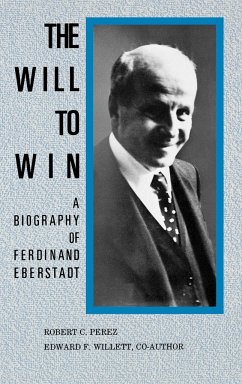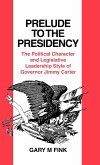Ferdinand Eberstadt, the man whose war production strategy was credited with shortening World War II by one full year, was America's financier extraordinaire. His contributions over a period of nearly fifty years helped to shape the world of business and finance as we know it today. In this lively analytical biography, Perez and Willett chronicle Eberstadt's career in the public and private sectors and explore the motives, methods, and personal style that were responsible for his successes as well as his failures. This balanced, clearly written account is packed with information and insight on both Eberstadt's career and the radical changes we have witnessed since the 1920s. Perez once worked for Eberstadt and knew at first-hand what a tyrant he was. Nevertheless, he conceived this biography as an exercise in hero worship. Despite this, it has turned out to be an objective study, and an invaluable mine of reference material. All Wall Streeters motivated to survive the next crunch will do well to arm themselves with this digest of the Eberstadt saga. Its scenario casts Eberstadt in twin roles: as the shrewdest proprietor of a Wall Street profit center during the market's ups and downs between the 1920s and 1960s; and as the most effective troubleshooter brought to Washington during the war years. Again and again, his genius for diagnosing the cause of a crisis enabled him to turn it into an opportunity--for himself, then for the country. Eliot Janeway, in Barrons, June 4, 1990 Ferdinand Eberstadt, the man whose war production strategy was credited with shortening World War II by one full year, was America's financier extraordinaire. His contributions over a period of nearly fifty years helped to shape the world of business and finance as we know it today. In this lively analytical biography, Perez and Willett chronicle Eberstadt's career in the public and private sectors and explore the motives, methods, and personal style that were responsible for his successes as well as his failures. The foremost American expert on German finance during the 1920s, Eberstadt achieved recognition as a financial negotiator at the Paris Reparations Conference in 1929. As an investment banker, he was instrumental in helping to restore confidence in the business community following the stock market crash, through his support of small, depressed blue chip firms. The performance of Eberstadt's trendsetting Chemical Fund, founded in 1938, led to the popularization of mutual fund investing in the 1950s and 1960s. Through a series of private capital deals involving chemical and pharmaceutical companies, Eberstadt and his partner strengthened those industries and in the process developed the leveraged buyout technique--a bold innovation that has achieved major importance in modern corporate financial strategy. This balanced, clearly written account is packed with information and insight on both Eberstadt's career and the radical changes we have witnessed since the 1920s. It will be of interest to a broad readership in business, finance, investment, government, and twentieth-century American history.
Hinweis: Dieser Artikel kann nur an eine deutsche Lieferadresse ausgeliefert werden.
Hinweis: Dieser Artikel kann nur an eine deutsche Lieferadresse ausgeliefert werden.








